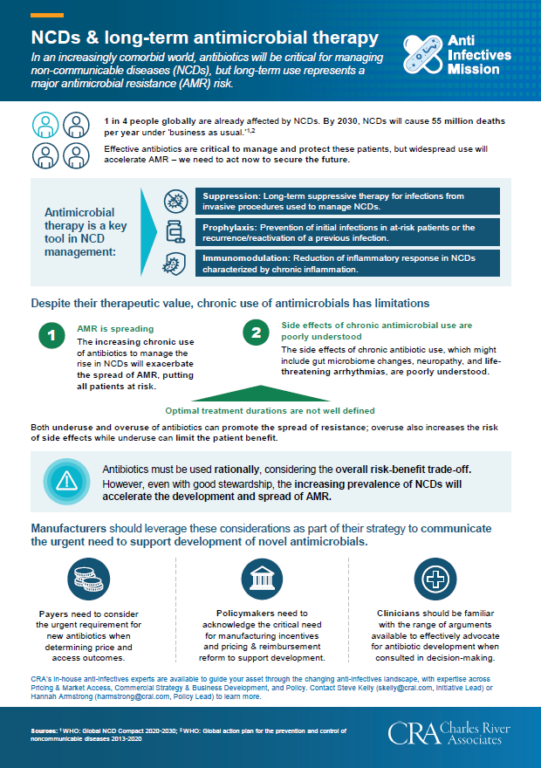In an increasingly comorbid world, antibiotics will be critical for managing non-communicable diseases (NCDs), but long-term use represents a major antimicrobial resistance (AMR) risk.
| 1 in 4 people globally are already affected by NCDs. By 2030, NCDs will cause 55 million deaths per year under ‘business as usual.’1,2 |
Effective antibiotics are critical to manage and protect these patients, but widespread use will accelerate AMR – we need to act now to secure the future.
Despite their therapeutic value, chronic use of antimicrobials has limitations
| AMR is spreading The increasing chronic use of antibiotics to manage the rise in NCDs will exacerbate the spread of AMR, putting all patients at risk. |
||
| Side effects of chronic antimicrobial use are poorly understood The side effects of chronic antibiotic use, which might include gut microbiome changes, neuropathy, and life-threatening arrhythmias, are poorly understood. |
![]()
Optimal treatment durations are not well defined
Both underuse and overuse of antibiotics can promote the spread of resistance; overuse also increases the risk of side effects while underuse can limit the patient benefit.
 |
Antibiotics must be used rationally, considering the overall risk-benefit trade-off. However, even with good stewardship, the increasing prevalence of NCDs will accelerate the development and spread of AMR. |
Manufacturers should leverage these considerations as part of their strategy to communicate the urgent need to support development of novel antimicrobials.
| Payers need to consider the urgent requirement for new antibiotics when determining price and access outcomes. | ||
| Policymakers need to acknowledge the critical need for manufacturing incentives and pricing & reimbursement reform to support development. | ||
| Clinicians should be familiar with the range of arguments available to effectively advocate for antibiotic development when consulted in decision-making. |
CRA’s in-house anti-infectives experts are available to guide your asset through the changing anti-infectives landscape, with expertise across Pricing & Market Access, Commercial Strategy & Business Development, and Policy. Contact Steve Kelly (skelly@crai.com, Initiative Lead) to learn more.
Sources: 1 WHO: Global NCD Compact 2020-2030; 2 WHO: Global action plan for the prevention and control of noncommunicable diseases 2013-2020




